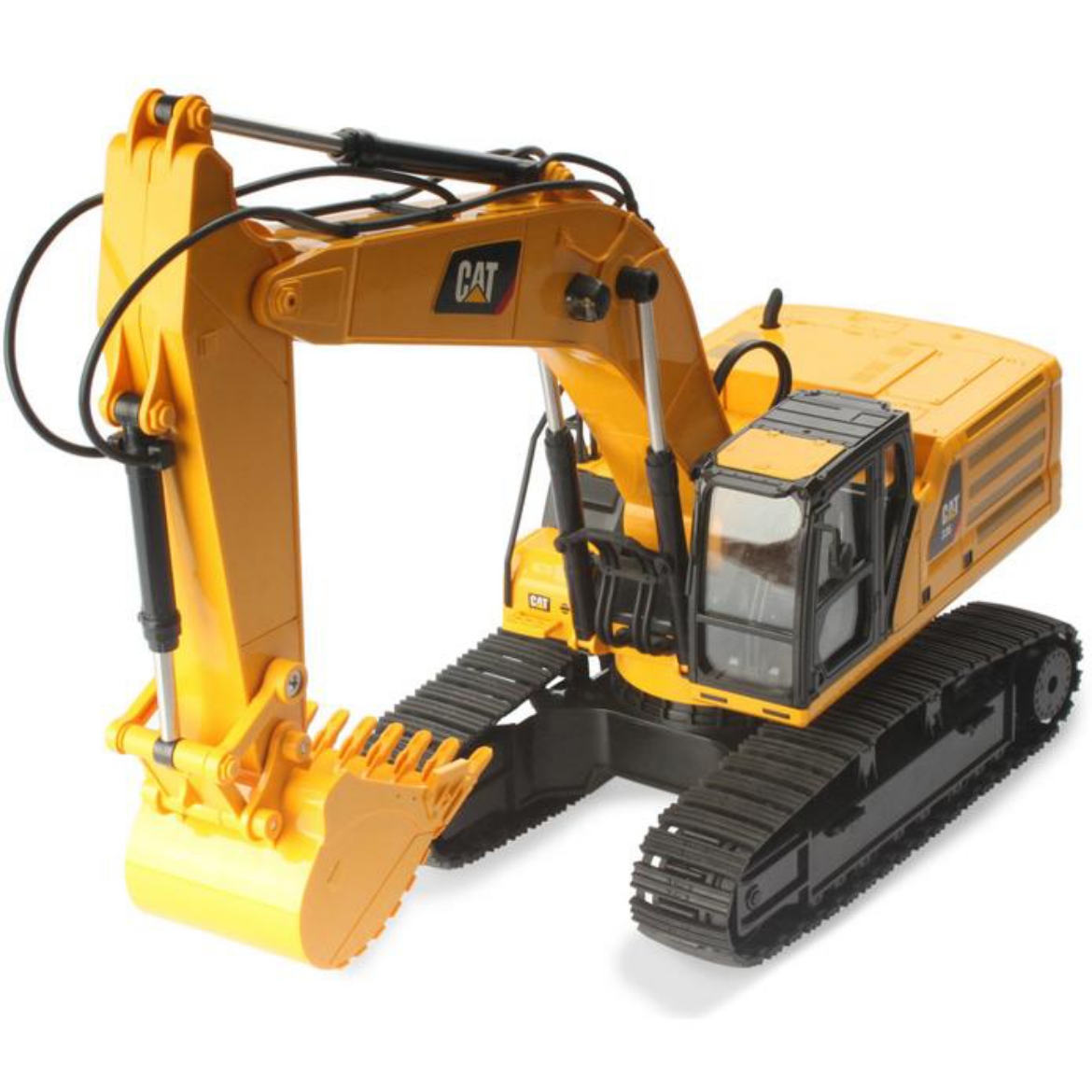Comprehending Exactly How Excavator Works and Its Effect on Performance
Excavators play a necessary duty in building and construction and mining operations, depending on a complex interaction of mechanical and hydraulic systems. Their ability to carry out a variety of jobs rests on both their design and the technology integrated within. Recognizing these parts can substantially influence functional performance and performance. As advancements remain to reshape the sector, one must think about exactly how these changes will affect future methods and performance.
The Essentials of Excavator Mechanics

The Role of Hydraulic Solutions in Excavators
At the heart of excavator procedure lies the hydraulic system, which plays a crucial duty in powering the maker's functions and motions. This system uses pressurized hydraulic fluid to move energy, allowing different activities such as moving, digging, and training. By utilizing the concepts of hydraulics, excavators can do jobs with exceptional accuracy and force, boosting general operational efficiency.The hydraulic system includes essential parts, including cyndrical tubes, valves, and pumps, which interact to control the circulation and instructions of the liquid. When the operator engages the controls, the hydraulic liquid is directed to particular cyndrical tubes, translating the driver's commands into physical activity. This system enables for receptive and smooth actions, which are crucial in construction and excavation environments. double e volvo rc excavator. The performance of the hydraulic system straight affects the efficiency and adaptability of the excavator, making it an important aspect in modern-day excavation processes
Key Components of an Excavator
Recognizing the vital elements of an excavator is crucial for grasping exactly how this powerful equipment operates. An excavator includes a number of significant components, including the undercarriage, residence, container, boom, and arm. The undercarriage provides security and wheelchair, frequently including wheels or tracks to navigate numerous terrains. Your home has the engine and hydraulic systems, permitting the operator to control motion and power the device. The boom prolongs from your house, enabling upright reach, while the arm attaches to the container, promoting digging and training operations.Additionally, the cab houses the operator, geared up with controls for specific maneuvering. Each of these parts plays a vital function in the excavator's total functionality, adding to its efficiency and effectiveness on building websites. Recognizing these components assists in enhancing and preserving excavator efficiency, making sure tasks are finished securely and properly.
Add-on Convenience and Its Benefits
Add-on adaptability is a vital facet of excavators, enabling drivers to change in between numerous tools tailored for specific jobs. This adaptability not only improves task effectiveness but likewise contributes to cost-effectiveness by minimizing the demand for numerous equipments. Recognizing the various types of add-ons available can significantly affect the general performance and capability of an excavator on work websites.
Kinds of Attachments
While excavators are largely identified for their excavating capacities, their true versatility depends on the vast array of accessories readily available. These add-ons enhance the excavator's functionality, enabling it to carry out numerous tasks beyond excavation. Common add-ons include containers (for digging and scooping), hydraulic thumbs (for comprehending materials), and augers (for drilling openings) Grapples are made use of for managing and relocating particles, while rippers can damage up difficult surface areas. Various other specialized add-ons, such as trenchers and plows, enable excavators to adjust to details work needs. This diversity not only raises the equipment's utility across various industries, including landscape design, demolition, and building and construction, yet also enables drivers to tailor their equipment to meet particular task needs effectively.
Increased Task Efficiency
Taking full advantage of job effectiveness is a primary advantage of making use of numerous excavator add-ons. Various attachments enable an excavator to perform multiple tasks without requiring to switch over devices, conserving important time and labor. Using a hydraulic hammer can damage concrete while a container accessory can excavate dirt, enabling a seamless operations. This convenience reduces downtime connected with tools changes and enhances performance on-site. Additionally, specialized attachments enhance precision in jobs such as grading or landscape design, resulting in greater top quality results. The capability to adjust to numerous task demands not just enhances procedures yet also lessens the demand for added machinery, guaranteeing that projects are completed swiftly and effectively. Generally, attachment convenience substantially adds to increased task effectiveness in excavation job.
Cost-Effectiveness and Adaptability
Cost-effectiveness is a considerable benefit of using flexible excavator accessories. These accessories enable a solitary excavator to execute numerous jobs, reducing the demand for additional machinery and labor - double e volvo rc excavator. By switching in between containers, hammers, and grapples, operators can deal with different tasks, from digging to demolition, thereby making best use of equipment application. This versatility not just decreases functional expenses but also minimizes downtime related to changing equipment. Furthermore, the capability to tailor excavators with specialized accessories enhances performance, as they can successfully manage diverse jobs according to task demands. To wrap up, the combination of cost-effectiveness and versatility in excavator attachments adds to improved functional effectiveness and resource allotment in building and excavation jobs

Advanced Technology in Modern Excavators
Modern excavators are significantly outfitted with advanced innovation that transforms excavation processes. Automation enhances procedures, while improved gas efficiency decreases functional expenses. In addition, wise control systems improve precision and safety, marking a considerable evolution in excavation devices.
Automation in Excavation Processes
As excavation technology advances, automation has emerged as an essential part in boosting efficiency and precision on job websites. Modern excavators are geared up with sophisticated automated systems that help with tasks such as grading, excavating, and trenching with marginal driver intervention. These systems use sensors, GPS, and artificial intelligence algorithms to guarantee exact positioning and deepness control, substantially reducing the margin for error. In addition, automation permits operators to concentrate on tactical decision-making instead of manual controls, causing boosted efficiency overall. Such developments not just enhance workflows yet also improve safety and security by lessening human mistake in complicated procedures. The combination of automation in excavation procedures represents a considerable improvement in construction technology, driving the industry in the direction of greater performance and effectiveness.
Enhanced Gas Performance
Innovations in modern technology have actually also brought about significant improvements in gas performance for modern excavators. Modern makers are furnished with sophisticated engines that enhance power outcome while lowering fuel consumption. These engines use cutting-edge burning innovations, such as turbocharging and direct fuel shot, to boost efficiency and performance. Additionally, lightweight products in construction reduce overall weight, permitting less energy expense during procedure. my company The intro of variable speed controls allows drivers to change engine efficiency according to particular jobs, additionally decreasing gas use. As a result, these enhancements not just lower functional expenses yet likewise add to environmental sustainability by reducing exhausts. On the whole, boosted gas effectiveness in excavators is an essential development that reinforces efficiency and financial feasibility in visit this web-site the building and construction market.
Smart Control Solution
While drivers navigate increasingly complex job sites, clever control systems in excavators have emerged as necessary devices for improving effectiveness and accuracy. These advanced innovations utilize algorithms and sensing units to keep an eye on various specifications such as load weight, surface conditions, and operational efficiency. By instantly adjusting hydraulic functions, wise systems maximize equipment performance, causing improved efficiency and minimized wear on parts. Furthermore, operators benefit from instinctive user interfaces that provide real-time feedback and diagnostics, allowing for educated decision-making. This integration of technology not just improves procedures however additionally lessens human mistake, adding to much safer job settings. As the building and construction market remains to advance, clever control systems will play a crucial duty fit the future of excavator efficiency and performance.
Enhancing Operational Effectiveness With Excavators
Excavators play a vital function in enhancing operational performance throughout numerous construction and excavation jobs. Their flexibility permits multiple jobs, including excavating, product, and lifting handling, which simplifies operations and minimizes the need for additional devices. With effective hydraulic systems, excavators can execute heavy-duty tasks with precision, significantly lowering the moment needed to total tasks. The combination of advanced modern technology, such as general practitioner and automated controls, better maximizes their operation, enabling drivers to accomplish better precision and reduce material waste. Furthermore, contemporary excavators are created to eat less fuel and lessen exhausts, adding to both expense financial savings and environmental sustainability. By utilizing excavators properly, building and construction groups can enhance performance, meet project due dates, and enhance overall website administration. This multifunctionality and performance make excavators important devices in the modern-day building and construction landscape.
The Future of Excavators in Building and Mining Industries
As the building and mining industries progress, the future of excavators is poised for considerable makeover driven by technological development and altering operational needs. Advancements in automation and expert system are reshaping excavator abilities, enabling improved accuracy and performance in operations. Autonomous excavators are emerging, minimizing the requirement for human intervention and decreasing the risk of accidents.Moreover, the combination of telematics and IoT technology enables real-time surveillance of device efficiency and anticipating upkeep, enhancing uptime. Eco-friendly designs, consisting of hybrid and electrical models, are obtaining traction, lining up with sustainability goals within the industry.Additionally, making use of advanced products and lighter layouts improves fuel effectiveness while keeping efficiency criteria. As these trends progression, excavators will certainly play an essential role in meeting the raising needs for performance and security in building and mining, ultimately changing functional landscapes.
Frequently Asked Inquiries
How Do Weather Influence Excavator Efficiency?

Weather condition conditions substantially affect excavator performance, as rainfall and mud can prevent traction and security, while severe temperatures may impact hydraulic systems. Operators has to adjust to these variables to guarantee perfect capability and visit site security during operations.
What Precaution Should Operators Adhere To While Using Excavators?
Safety steps for excavator operators consist of wearing suitable individual safety tools, conducting pre-operation examinations, making certain appropriate communication with ground personnel, keeping a safe range from overhanging hazards, and sticking to well-known functional protocols to avoid accidents.
How Commonly Should Excavators Be Kept for Optimum Performance?
Excavators need to be preserved on a regular basis to ensure peak efficiency, usually every 250 operating hours or as specified by the manufacturer. Routine checks enhance dependability, prevent unexpected breakdowns, and prolong the lifespan of the tools.
What Is the Average Life-span of an Excavator?
The average lifespan of an excavator generally ranges from 10,000 to 15,000 hours of procedure. Elements affecting longevity include upkeep techniques, running conditions, and the high quality of the maker itself, influencing general productivity and effectiveness.

Can Excavators Operate Unequal Surface Properly?
Excavators can run effectively on uneven terrain due to their expressed designs and flexible tracks. These attributes allow them to keep security and grip, enabling efficient procedure in challenging atmospheres commonly encountered in building and construction and landscape design jobs. Each of these components plays an important duty in the excavator's overall capability, adding to its efficiency and effectiveness on building and construction websites. Maximizing task efficiency is a primary benefit of making use of different excavator add-ons. While operators browse significantly complicated task websites, clever control systems in excavators have emerged as important devices for boosting effectiveness and precision. Excavators play a crucial role in boosting functional efficiency across numerous building and construction and excavation projects. Breakthroughs in automation and synthetic intelligence are improving excavator capacities, permitting for enhanced precision and effectiveness in procedures.